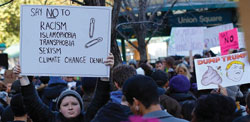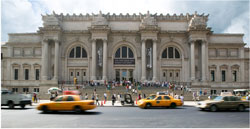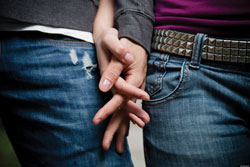A loose button, a top that is too big for your body, a broken dress zipper– all of these fashion emergencies can be fixed by a safety pin. However, since the recent Presidential election, safety pins have taken on a whole new meaning. Rather than being used as a fashion fix, they are being utilized as a political statement. They have become an actual pin of safety, symbolizing that those who wear the pin are allies to people of color, immigrants, the LGBTQ community, religious minorities, and anyone else who has experienced discrimination.
The outcome of this election has pinpointed President-Elect Donald Trump and his anti-Muslim and anti-immigrant rhetoric to be the cause of tthe safety pin trend, but could it just be that there is simply more light being shed on them? This safety pin movement is giving people a way to combat the fears and behaviors being instilled by those who are acting out.
The safety pin concept originated in the United Kingdom, following Britain’s decision to leave the Eurpean Union. After the vote, there was an increase in hate crimes against immigrants and minorities. According to Town Hall, the Southern Poverty Law Center reported over 200 incidents of “hateful harassment and intimidation” since Election Day; most incidents were labeled Anti-Black and anti-immigrant.
A junior communication student, Valentina Sanchez, said, “As a Latina woman, I feel like it is important to show my support and wear the pin as a symbol of unity and to create awareness amongst others. In my opinion, if you wear the pin and see an act of discrimination, you should do something.”
Many have challenged the safety pin movement by questioning the amount of good it can do. After all, other than displaying support, wearing a safety pin can only do so much. However, this is just the beginning. Flashback to the days of the ALS Ice Bucket Challenge, when people dumped buckets of ice water on themselves to raise awareness of amyotrophic lateral sclerosis. The term “slacktivism” is used for social media activist movements that seem to focus a lot more on the performance and attention, rather than the cause. Despite that stigma, the ice bucket challenge was also focused on the reaction. It raised a lot of money and awareness, which in turn allowed scientists to discover a new gene that they believe contributes to the disease.
Whether the safety pin movement is good or bad, it is giving those feeling fear and helplessness a sense of hope. The pin surely cannot fix everything, but it is unfair to say that this symbol is “not enough”. The pin is the start of a change.
Dr. José Miguel Maldonado, Department Chairperson and Associate Professor in the Educational Counseling and Leadership Department, shared, “We wanted to let it be known that we stand in solidarity with, and allies of, anyone and everyone who feels unsafe, unheard, and/or oppressed in today’s society. Being in the counseling field, we advocate for social justice in any way that we can, and this was the perfect opportunity to get the rest of Monmouth’s campus involved, even if it was as simple as wearing a safety pin on their clothing.”
Monmouth University students have begun showing their support for the cause. Pins were being handed out in the Student Center, as well as by individuals who felt strongly about the movement.
Samantha Bartek, a graduate student in the Educational Counseling Program, commented, “I decided to implement this on campus because I felt as though in today’s society there are just far too many people and marginalized groups that don’t have the support they deserve and so desperately need. While this is just a very small movement that was brought to campus, it stands for something so much bigger. I wanted to show that I am an ally for anyone and everyone in this country, and all over the world, that may feel scared or unheard, and I thought it would be a good way to start to get Monmouth university as a whole more involved in doing the same.”
Although the symbol for this movement is seen as a flimsy pin, it holds more weight to it than that. Displaying a pin on your chest is more than just an easy fix for fashion emergencies. Racism, homophobia, immigration opposition, prejudice. It is a token of alliance with all of those who bare burden to being exposed to these things. Again, it may not be the final solution, but it is certainly a boost in a new direction aimed above all of the hate and negativty.
IMAGE TAKEN from Daily Wire




